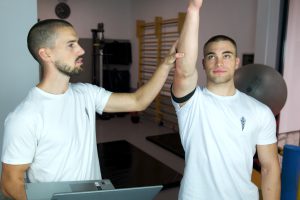
Recently, a young Hungarian javelin thrower sought help.
Her issues with her right shoulder began a year ago, and in the meantime, she underwent appropriate therapy at another medical facility, which reduced the symptoms. However, it did not completely eliminate them.
Despite regularly doing prescribed exercises, she still cannot throw without pain, and therefore cannot achieve the results she aspires to.
The examination showed no clear inflammatory process or tissue damage, and the pain was related to the less mobile right scapula. The way her scapula moves during arm movements indicated that, at this moment, the so-called stabilization exercises, which initially helped her reduce pain, caused a new problem that now troubles her. By changing the exercises and providing additional education on how and when to perform them, the issues disappeared, and she is now training at full intensity without pain.
Many similar stories could be told, ranging from benign to more serious problems caused by therapeutic procedures that were either not discontinued in time or applied in entirely inappropriate situations. Lately, we most often see them as a result of self-attempts at treatment, following advice obtained from the internet or from individuals who have had “the same problems” and feel confident enough to give advice based on personal experience.
Every clinician learns early on the simple truth that therapy or medication is only effective if applied in precisely defined circumstances and only for as long as necessary. Even then, success is not always guaranteed. Differences between patients, which may not always be clearly visible or seem important, affect the effectiveness of therapy. The protocols we follow in determining therapy are merely recommended directions that must be adjusted to the specific case. Monitoring the therapeutic effect is of paramount importance because the body’s reaction indicates whether the direction of treatment is appropriate or needs to be corrected. Therefore, expert guidance in any treatment is essential.
